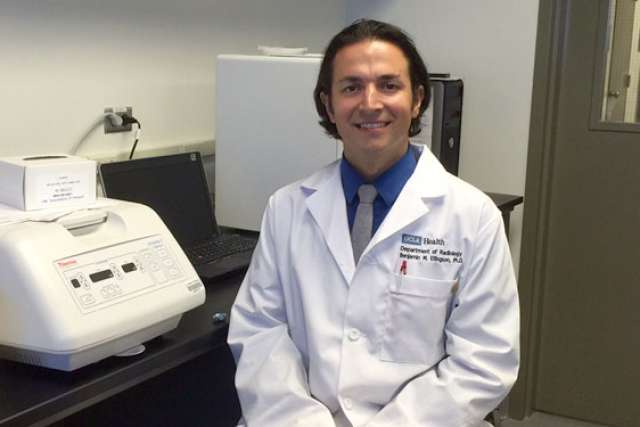Dr. Benjamin Ellingson, UCLA Jonsson Comprehensive Cancer Center member and associate professor of radiological sciences, has been awarded a prestigious Research Scholar Grant by the American Cancer Society to further develop a groundbreaking new imaging technique for the early identification of brain cancer tumors.
The Research Scholar Grant is bestowed annually by the American Cancer Society (ACS). With a primary focus on beginning investigators, the ACS’s Extramural Grants Program seeks to support innovative research across a wide range of disciplines to meet critically important needs in the control of cancer.
Today, it is estimated that over 130,000 men and women in the United States are living with brain cancer. Current research has shown that low pH (interstitial acidosis) is fundamental to creating an environment in our bodies hospitable to the disease, and the condition is directly linked to an increase in cancer tumor growth and mutation, a decrease in immune system function, and resistance to common cancer treatments including radiation and chemotherapy.
The preliminary work of Ellingson and colleagues sought to develop a first-of-its-kind high-resolution “pH-weighted” non-invasive imaging technique capable of identifying cancer tumor growth and the beginnings of treatment resistance earlier than ever before. Called “Chemical Exchange Saturation Transfer” or CEST-MRI, the technique can be done on conventional MRI systems without the need for additional hardware or significant cost.
The four-year, $790,000 grant will allow Ellingson’s team to further develop, validate, test and improve the effectiveness of CEST-MRI. His team aims to significantly improve its speed and accuracy, allow for full coverage and mapping of the brain, and increase its ability to predict resistance to a wider variety of common cancer therapies (such as radiation, chemotherapy and anti-angiogenic therapy).
Ellingson hopes to share this research with other laboratories and clinics in order to gain wider clinical acceptance of CEST-MRI and further the development of new and innovative therapies for brain cancer.
The research is also supported by funding from the UCLA Department of Radiology.




